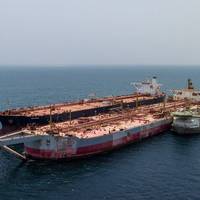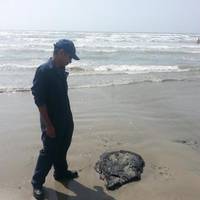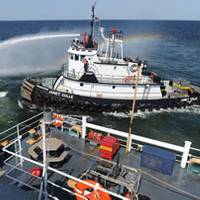Video: Ship-to-Ship Oil Transfer from FSO Safer Progressing Well

The ship-to-ship transfer of the oil from the FSO Safer to the replacement oil tanker Yemen (formerly known as Nautica) began last week.It was an important milestone in this United Nations-coordinated operation to avert a potential massive environmental and humanitarian disaster off the coast of Yemen.Boskalis reports that the oil transfer is progressing well and will take two to three weeks.Hydraulic pumps have been lowered into each tank of the FSO Safer. During the transfer operation, inert gas is supplied to keep the tank atmosphere at safe levels during the operation.
Tar Balls Cleaned fromTexas Shoreline

Coast Guard members are working with Miller Environmental Services and Texas General Land Office specialists to clean up naturally occurring tar balls discovered on 20-mile stretch of land from Padre Island National Seashore to the beaches of Port Aransas, Tuesday. Beachgoers contacted Coast Guard Station Port Aransas Sunday to report that tar patties were washing ashore. Sector Corpus Christi deployed personnel from their Incident Management Division to respond. Currently, a team comprised of individuals from the three agencies is surveying the shoreline and removing the tar balls.
Gulf Oil Spill: Ships Face Few Delays

As oil from BP's sub-sea well laps coastal Louisiana, most ships in the Gulf have avoided contact with the spill but owners fear that regulations will be tightened after the disaster, raising their costs. “We've seen no delays from the spill, and it hasn't affected the operations of any of our ships,” said Dean Taylor, president of Tidewater Inc. in late May. Four vessels owned by Tidewater, which is headquartered in New Orleans, have been involved in recovery efforts. The company's work boat Damon B.
Ballast Water Treatment Through Biodispersion
The process of bioremediation of waste oil through patented biodispersion technology, consists of a breakthrough in ballast water treatment, which has been discovered via research based on the evaluation of SpillRemed (Marine), which was developed on the basis of biodispersion technology for remediation of bilge water on boats and ships in an effort to develop an environment friendly solution to the problem of operational discharges by ships. A study was conducted on board cruise ships equipped with oil water separators. SpillRemed (Marine) is considered a suitable replacement to chemical dispersants. Although in volumes as large as found on such ships…
French PM Tours Oily Coast, Vows Safety Crackdown
French Prime Minister Lionel Jospin, touring beaches devastated by oil seeping from a sunken tanker off the Atlantic coast, pledged to press for stricter global safety rules. Jospin, who cut short a trip to Egypt to return to France as it was hit by violent storms that killed some 60 people and drove two separate oil slicks to its coastline, vowed to use the French presidency of the European Union next year to push for new laws. "We are going to draw the lessons for international regulations," he said. "We are going to make precise proposals. French media reported that the oil slicks, which seeped from the tanker Erika after it sank on Dec. 12, were now threatening 250 miles of France's rugged Atlantic coast, which is heavily dependent on fishing and tourism.





